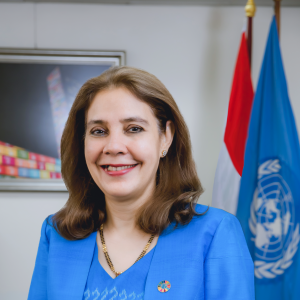Eco-Business’ Unlocking Capital for Sustainability: Empowering Change: Financing Indonesia’s Green and Blue Economy - Resident Coordinator's Speech, Gita Sabharwal
-----
Kwok Fook Seng, Singapore’s Ambassador to Indonesia
Meaghan See, Director of Partnerships, Eco-Business
I am delighted to join you as we unlock capital for Indonesia’s blue and green economies in line with the President vision of energy, food and water security premised on an ambitious growth trajectory.
Indonesia has committed to reducing its emissions by 43% and achieving net zero by 2060 while balancing economic growth and environmental sustainability.
To that end, the Government, with technical assistance from the UN, is profiling the carbon absorption capacity of sea grass, seaweed and the ocean to better understand how well they can serve as carbon sinks.
These will be included in Indonesia’s second NDCs.
The greening of the country’s economy will necessitate scaling up sustainable financing and deepening private sector engagement.
Leveraging domestic investments for this ambitious transformation is particularly key in today’s global climate with economic slowdowns.
Progress or setbacks in one country impact the economies of other nations.
For instance, Singapore relies heavily on renewables in Indonesia for its own energy needs. This means that the Lion City’s investments in Indonesia are going to drive domestic solar production contributing to Indonesia’s green energy transformation.
This is crucial as analysis tells us that the financing gap on the SDGs in Indonesia stands at $1.7 trillion.
Closing this gap will require the private sector to mobilize capital while being ready to take calculated risks in support of sustainability, which will bolster bottom lines.
Together with the Ministry of Finance, the UN has supported the issuance of SDG, green and blue sovereign bonds unlocking $11.6b from domestic and international markets.
The proceeds enable the government to scale up financing for sustainable fisheries and aquaculture, mangrove rehabilitation and solid waste management.
Unlocking capital will also require working with provincial governments to strengthen their capacity for issuing municipal bonds predicated on robust financial assessments.
This has the potential to unlock additional $2 billion for accelerating green and blue transformations.
Encouragingly, more and more businesses are reaching out to the UN for support in structuring thematic bonds to mobilize financing for affordable green housing and energy.
Technical assistance from UNDP supports the development of these bond frameworks, defining impact metrics and reporting against set targets.
In a fiscally strained climate, banks are also critical for ensuring the long-term sustainable financing of the green and blue transitions.
Five national banks, in partnership with UNEP, have adopted the UN’s Principles for Responsible Banking to develop sustainable financing plans and scale up ESG investments.
Every percentage point increase in ESG investments by these banks translates into an additional $1.23 billion for green growth. This growth is likely to be driven largely by the scaling up of solar energy and electric vehicles.
One of these banks is scaling up lending for affordable green housing in line with a national priority to bridge the housing gap.
The UN is supporting this transformation by aligning behind government policies and programmes in partnership with the private sector and civil society.
This includes promoting sustainable forest management nationwide, covering over 23 million hectares in one of the world’s most biodiverse nations.
Protecting these forests contributes 27 million metric tons in emission reductions and provides livelihoods for 720,000 people across Indonesia.
At the same time, emerging coral insurance initiative seeks to protect reefs and livelihoods together with the private sector and communities.
Similarly, led by UNDP, the UN has provided policy and technical support to leveraging digital technologies in marine conservation, including strengthening regulatory frameworks and enhancing institutional capacities.
This is leading to efficiency gains in the management of nearly half of marine protected areas.
We are also turning to hard-to-reach sectors like small-scale fisheries.
The UN is leveraging Islamic financing to retrofit 800,000 small diesel powered fishing boats with hybrid engines.
We are running a small pilot in Maluku to show how converting these boats to a solar hybrid can be a win-win to boost livelihoods while reducing emissions and other environmental impacts.
To scale this up, we are exploring private sector partnerships, including with Sharia banks, to unlock additional financing and reach more coastal communities.
None of these transformations are possible without deepening engagement from the private sector.
The sector already plays a pivotal role in Indonesia’s development, making up 83% of the economy and generating 9 out of every 10 jobs.
Leveraging our partnership with the private sector through the IGCN allows us to move the needle on the SDGs.
For instance, industrial parks are aligning with international eco-standards, creating demand for best available technologies and environmental practices across factories.
We have learned that once these are introduced the industries have moved quickly to adopt and scale them up because the benefits are clear: lower costs, lower emissions and stronger competitiveness.
Platforms like today’s dialogue are critical for bringing all stakeholders together to share expertise and critical insights.
I would like to encourage you to reach out to us at the UN for deepening our collaborations on Indonesia’s green and blue transformations.
Our experience tells us that the UN delivers best when it focuses its capabilities and fully aligns behind national priorities while building coalitions of shared purpose.
It is only through strengthening our partnerships that we can deliver the scale and pace commensurate with the ambitions of Indonesia.
Thank you
Speech by





